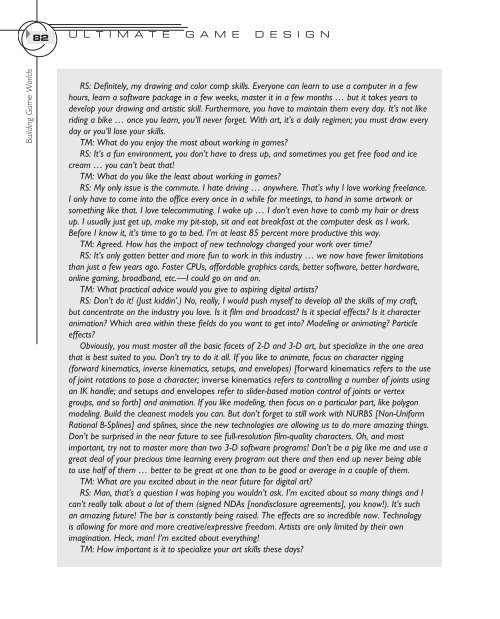Ultimate Game Design : Building game worlds
Ultimate Game Design : Building game worlds
Ultimate Game Design : Building game worlds
Create successful ePaper yourself
Turn your PDF publications into a flip-book with our unique Google optimized e-Paper software.
<strong>Building</strong> <strong>Game</strong> Worlds<br />
82<br />
U L T I M A T E G A M E D E S I G N<br />
RS: Definitely, my drawing and color comp skills. Everyone can learn to use a computer in a few<br />
hours, learn a software package in a few weeks, master it in a few months … but it takes years to<br />
develop your drawing and artistic skill. Furthermore, you have to maintain them every day. It’s not like<br />
riding a bike … once you learn, you’ll never forget. With art, it’s a daily regimen; you must draw every<br />
day or you’ll lose your skills.<br />
TM: What do you enjoy the most about working in <strong>game</strong>s?<br />
RS: It’s a fun environment, you don’t have to dress up, and sometimes you get free food and ice<br />
cream … you can’t beat that!<br />
TM: What do you like the least about working in <strong>game</strong>s?<br />
RS: My only issue is the commute. I hate driving … anywhere. That’s why I love working freelance.<br />
I only have to come into the office every once in a while for meetings, to hand in some artwork or<br />
something like that. I love telecommuting. I wake up … I don’t even have to comb my hair or dress<br />
up. I usually just get up, make my pit-stop, sit and eat breakfast at the computer desk as I work.<br />
Before I know it, it’s time to go to bed. I’m at least 85 percent more productive this way.<br />
TM: Agreed. How has the impact of new technology changed your work over time?<br />
RS: It’s only gotten better and more fun to work in this industry … we now have fewer limitations<br />
than just a few years ago. Faster CPUs, affordable graphics cards, better software, better hardware,<br />
online gaming, broadband, etc.—I could go on and on.<br />
TM: What practical advice would you give to aspiring digital artists?<br />
RS: Don’t do it! (Just kiddin’.) No, really, I would push myself to develop all the skills of my craft,<br />
but concentrate on the industry you love. Is it film and broadcast? Is it special effects? Is it character<br />
animation? Which area within these fields do you want to get into? Modeling or animating? Particle<br />
effects?<br />
Obviously, you must master all the basic facets of 2-D and 3-D art, but specialize in the one area<br />
that is best suited to you. Don’t try to do it all. If you like to animate, focus on character rigging<br />
(forward kinematics, inverse kinematics, setups, and envelopes) [forward kinematics refers to the use<br />
of joint rotations to pose a character; inverse kinematics refers to controlling a number of joints using<br />
an IK handle; and setups and envelopes refer to slider-based motion control of joints or vertex<br />
groups, and so forth] and animation. If you like modeling, then focus on a particular part, like polygon<br />
modeling. Build the cleanest models you can. But don’t forget to still work with NURBS [Non-Uniform<br />
Rational B-Splines] and splines, since the new technologies are allowing us to do more amazing things.<br />
Don’t be surprised in the near future to see full-resolution film-quality characters. Oh, and most<br />
important, try not to master more than two 3-D software programs! Don’t be a pig like me and use a<br />
great deal of your precious time learning every program out there and then end up never being able<br />
to use half of them … better to be great at one than to be good or average in a couple of them.<br />
TM: What are you excited about in the near future for digital art?<br />
RS: Man, that’s a question I was hoping you wouldn’t ask. I’m excited about so many things and I<br />
can’t really talk about a lot of them (signed NDAs [nondisclosure agreements], you know!). It’s such<br />
an amazing future! The bar is constantly being raised. The effects are so incredible now. Technology<br />
is allowing for more and more creative/expressive freedom. Artists are only limited by their own<br />
imagination. Heck, man! I’m excited about everything!<br />
TM: How important is it to specialize your art skills these days?

















